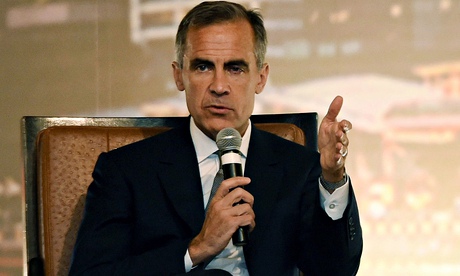Here’s one way to keep those footloose and greedy bankers in London after Brexit: appeal to their wallets by dropping the cap on bonuses, which only applies in the EU.
The Bank of England may indeed abolish the cap, Governor Mark Carney hinted on Wednesday, even if the motivation is not vulgar opportunism but an analysis of which financial rules could be rolled back outside the EU.
Bank officials always regarded the cap as a technically illiterate piece of legislation, and their worry was justified. The EU’s approach, predictably, was gamed by bank bosses who awarded themselves huge “role-based allowances” by way of “compensation” for their lower earning potential. In that way, non-contractual payments were turned into guaranteed ones, making it harder for the regulator to order a firm to slash bonuses to preserve capital during times of crisis.
Do not surprised, however, if that nuance is lost if the UK is seen, in effect, to tell bankers that fatter bonuses are possible after Brexit. EU leaders will scream that London is leading a race to the bottom. The politics will look terrible on the home front too. We’re paying £50bn to leave the EU and bankers can get bigger bonuses? That’s a tricky sell – and another line that wasn’t on the leavers’ bus.
LSE row shows why companies need to be more transparent
In the best farces, everyone ends up losing. So it is at the London Stock Exchange Group, where the three principal characters will stagger from the stage as diminished figures.
Xavier Rolet, the LSE chief executive, will spend more time with his vineyard sooner than he expected. He had been set to leave at the end of next year but is now out of the door immediately.
He grumbles about “a great deal of unwelcome publicity, which has been unhelpful for the company”, but he is an old City hand who should have known how the script would run. Regulators were bound to back the board in a power struggle at an important City institution. When Carney spoke on Tuesday about an “agreed” succession plan and how “everything comes to an end”, the game was up.
Rolet has enjoyed a glorious nine years at the LSE, in which time the share price has risen from £6 to £37, and a multimillion-pound payoff will ease his bruises, but it’s a messy way to go.
Donald Brydon, the chairman, made the basic error at the outset of refusing to explain to shareholders why the board wished to change its chief executive. The omission was glaring and high-handed. In the 21st century, you’ve got justify your decisions – not necessarily in full technicolour, but at least in outline. If Rolet’s management style was deemed a problem, there are ways of saying so without inviting uproar.
Brydon had boasted about running an “orderly” succession plan and has instead delivered a version that is as chaotic as they come. His innings will be cut short in April 2019 as a result. Brydon has chaired many public companies, including Royal Mail at the time of privatisation, but being battle-hardened was no use this time. The job was to prevent a battle breaking out.
As for Sir Christopher Hohn, the head of the the Children’s Investment Fund, his rebellion has spectacularly backfired. Hohn wanted to extend Rolet’s reign at the exchange until 2021, but instead, he’s shortened it by a year.
It was fair for the hedge fund manager to protest about the LSE’s failure to explain, but Hohn’s tactics became bizarre in the later stages. The call for regulators to intervene to resolve the crisis was optimistic in the sense of being half-baked. Carney semi-intervened by speaking out, but he said the opposite of what Hohn wanted to hear.
Still, we’ve been treated to an entertaining City bust-up that has usefully reminded the audience that even at successful companies, power struggles can lie around the corner. It has been “mystifying”, as Carney put it, but could also have been prevented. In future, boards may conclude that a little transparency on day one can prevent a lot of trouble later. That would be a good thing.
Nuanced reason for scrapping bonus cap will be a hard sell
Here’s one way to keep those footloose and greedy bankers in London after Brexit: appeal to their wallets by dropping the cap on bonuses, which only applies in the EU.
The Bank of England may indeed abolish the cap, Mark Carney hinted on Wednesday, even if the motivation is not vulgar opportunism but an analysis of which financial rules could be rolled back outside the EU.
Bank officials always regarded the cap as a technically illiterate piece of legislation, and their worry was justified. The EU’s approach, predictably, was gamed by bank bosses who awarded themselves huge “role-based allowances” by way of “compensation” for their lower earning potential. In that way, non-contractual payments were turned into guaranteed ones, making it harder for the regulator to order a firm to slash bonuses to preserve capital during times of crisis.
Do not surprised, however, if that nuance is lost if the UK is seen, in effect, to tell bankers that fatter bonuses are possible after Brexit. EU leaders will scream that London is leading a race to the bottom. The politics will look terrible on the home front too. We’re paying £50bn to leave the EU and bankers can get bigger bonuses? That’s a tricky sell – and another line that wasn’t on the leavers’ bus.
Only the inevitable crash will stop the bitcoin runaway train
It’s hard to keep up with bitcoin. One minute the cryptocurrency is worth $10,000, the next $11,000. It was $1,000 in March. We’re at a point in the speculative mania where almost any price prediction, however outrageous, can sound vaguely plausible.
Do not doubt, however, that this a bubble. Economist Joseph Stiglitz is right to point to the obvious drawback with the digital currency – “it doesn’t serve any socially useful function”. Solid common sense from a Nobel laureate won’t make a difference, of course. Only the inevitable crash will stop the runaway train.
- Follow Guardian Business on Twitter at @BusinessDesk, or sign up to the daily Business Today email here.











